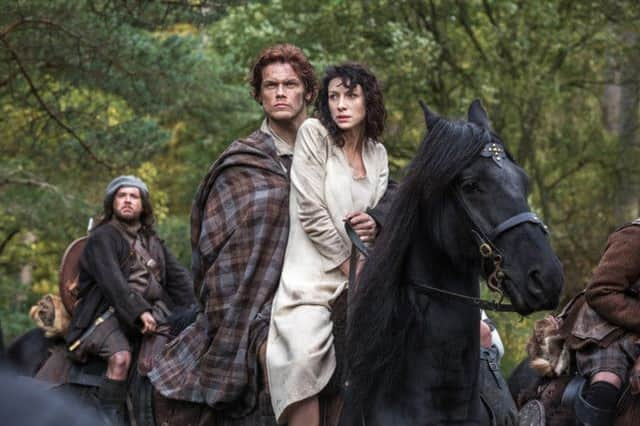Taskforce call for Scotlands’ ailing film industry


Industry leaders say intervention from Scottish Government is needed to come up with a rescue plan after it emerged the country was sliding dramatically down the UK’s league table of productions hubs.
Ministers have been urged to remove £1 million from Scottish Enterprise’s budget and re-allocate it to the film industry to help kick-start a turnaround.
Advertisement
Hide AdUnder the proposal, the cash injection would pay for the creation of a “beefed-up” screen sector department within Creative Scotland, or a completely separate agency with responsibilty for funding productions.
Holyrood’s tourism committee heard that Scotland was being failed by a lack of leadership, finance and facilities and as a result had slipped from being the biggest base for film and television outside London to fourth or fifth in recent years.
FOLLOW US
-----------------------------------------
-----------------------------------------------------
SCOTSMAN TABLET AND PHONE APPS
Scotland missed out on the fantasy series Game of Thrones to Northern Ireland while the American sci-fi series Outlander only shot in Scotland after the Scottish Government helped pay for the conversion of a vast warehouse complex in Cumbernauld.
Film producers told MSPS they had had 26 meetings with Creative Scottish and Scottish Enterprise, who share responsibility for the two industries, since a damning review of the sector was published a year ago - without any action being taken.
Responsibility
The head of the British Film Commission and organisers of the Edinburgh International Film Festival both said there an urgent need to make clear who was ultimately responsible for the sector.
John Archer, chair of Independent Producers Scotland, which was set up nearly two years ago to try to secure a better deal for the film and TV industries, told the committee that Deputy First Minister John Swinney had instructed Scottish Enterprise to “sort out” the film industry last March, but that “nothing has been addressed.”
Advertisement
Hide AdHe told the committee: “What we want to see is the Scottish Government set a screen policy, informed by producers and the various agencies, which says: ‘This what we expect of you over this next few years.’ That’s what happens in other countries like Denmark.
“It’s not bureaucratic change we’re looking for, we want leadership, just like they in Northern Ireland, where they’ve said they will be the strongest screen agency and have the strongest industry outside London in the next 10 years. Their plan and strategy is very clear. We need to see Scotland doing much better.”
Advertisement
Hide AdArabella Page Croft, the producer of hit film Sunshine on Leith, said there had been a total failure to address “the systemic issue of market failure” in the industry.
“There are now only a handful of producers working in Scotland today who are making regular work.
“We strongly believe that we require government intervention and the creation of a taskforce that is answerable to government to rectify this crisis.
“We would like to see consideration for film being completely removed from Scottish Enterprise’s remit. It is simply not fit for purpose for looking after our sector.”
Glasgow-born producer Iain Smith, the current chair of the British Film Commission, said: “There are figures coming out at the end of this month that are going to show that the British film industry was worth more than £1 billion over the last year. It is a failure of Scotland not to be competing for a proper share of that market.
“Twenty years ago, Scotland had the biggest production cluster outwith the south-east of England. Now it is probably fourth or fifth. When you look at other clusters that are growing in Northern Ireland, Manchester, Leeds, Wales and Bristol, Scotland is now lagging badly behind.
Advertisement
Hide Ad“The producers of Game of Thrones actually wanted to come to Scotland, they knew it was bigger and had lots of locations, but the thing that stopped it was the lack of adequate shooting space.”
Drew McFarlane, national organiser for Scotland and Northern Ireland at actors’ union Equity, said: “Northern Ireland has stolen a march on Scotland for some time now.
Advertisement
Hide Ad“What we don’t have in Scotland, which we have there, is one lead body which is fairly aggressive and is out there working on behalf of the production industry. We have two quangos in Scotland who don’t seem to take the lead from each other.”
Key Hay, chief executive of the Centre for the Moving Image, which runs the EIFF and the Filmhouse cinema in Edinburgh, said: “There is a real requirement for a genuine commitment from politicians to say: ‘This is what we’re trying to achieve.’
“It is nine years ago this week that the policy document which led to the creation of Creative Scotland was published.
“It actually said there was a current lack of clarity over the roles of central government, Scottish Enterprise and cultural organisations have in relation to assisting the creative industries to thrive.
“What we’ve managed to achieve over the last nine years is nothing. It’s just as bad now as it was at that point.
“Unless there is recognition that film is both cultural and industrial, and needs to be looked at differently, then we’re going to be having the same conversation in another nine years.”
Advertisement
Hide AdIn its own submission to the Holyrood inquiry, the Scottish Government says it is “committed to taking whatever action is possible to provide support to Scotland’s screen sector.”
It adds: “This includes a rigorous and detailed approach to exploring any options that help to improve and enhance Scotland’s offer in terms of studio facilities.”
Scottish culture secretary Fiona Hyslop is due to appear before MSPs next month as part of the inquiry.
